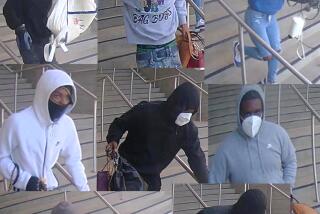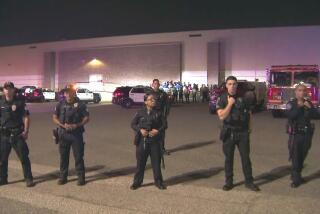The Mall Patrol : Law enforcement: This is the busiest--and most emotional--week of the year for a new breed of police officers.
Several teen-age Explorer Scouts rush into the Los Angeles Police Department’s cubbyhole substation in Topanga Plaza to report a brewing crisis in the mall:
“People are throwing things at Santa!”
“Do we take them in?” asks one of the volunteer police helpers.
“No,” Officer Bob Watson says. “Just stand up there. Be a presence.”
As the Explorers rush out, a mother arrives to pick up her 15-year-old daughter, arrested for stealing three tank tops from Nordstrom. The mother apologizes to one of the officers, John Artes, then tells the girl, “You’re dead.”
So goes the busiest--and most emotional--week of the year for a new breed of police beat officers, the Mall Cops.
Just as December is the busiest shopping season, so is it peak shoplifting time. It’s the month officers see not only the habitual thieves--the drug addicts and women with layers of stolen dresses under their own--but also legions of teary-eyed first offenders, some insisting that they stole out of desperation or to get gifts for friends.
Although police are trained skeptics, a few of the cases can’t help but move them: Among the 13 suspects processed Tuesday at the Torrance police substation in the Del Amo Fashion Center are two sets of parents found hiding children’s clothing in their toddlers’ strollers. On Christmas Eve, a 13-year-old boy tries to swipe a set of watercolor paints and brushes at the huge Torrance mall.
Officer John Senger learns that the boy’s father is out of work and his mother had difficulty finding $2 to give him to shop.
“I gave her a Christmas present,” Senger said. “I sent the boy home, just released him.”
The Glendale Police Department established the first mall substation in Southern California in 1982, and now assigns a sergeant and five officers to its wood-paneled offices in the Glendale Galleria. Veterans there have grown accustomed to a nearly 25% jump in shoplifting in December, although this year it’s been “a little bit quieter,” Officer Ernie Garcia said.
But for officers at the six-month-old Topanga Plaza station, the first such police facility in the San Fernando Valley, it was a first taste of the frantic trials of the holiday season.
“We’ve tripled our arrests over prior months,” said Watson, a senior officer at the Canoga Park office, which also serves the nearby Promenade and Fallbrook malls. Where there were about 50 arrests in other months, he said, 132 have been recorded already in December.
“About half are your regular shoplifters. They’ve done it in the past,” Watson said. “But we’re getting a lot of first-timers too. Some say they don’t have money. Or they’re stealing for a friend. . . .
“With most, this is just an excuse they use. But with others . . . others you believe.”
While mall storefronts may be on the cutting edge of law enforcement’s current hot trend, “community policing,” no one pretends it’s glamorous duty.
For Watson, a 22-year Los Angeles Police Department veteran, setting up the Topanga Plaza operation was a final assignment before retirement in two months. Two junior officers, both with less than three years on the force, look forward to future police specialties: Artes, 29, is a pilot and hopes to join the Air Support unit; Susan Clemmer, 24, aspires to be a narcotics investigator.
But this Tuesday, police work for them means the Community Assistance Office at the mall.
They walk foot patrols past the shops, hurry to a fight between two women on the upper level (one didn’t like “the look” the other gave her) and tend to a young mother who fell and hurt her back.
Mostly, though, they process shoplifters seized in citizen’s arrests by store security officers. Police have little discretion in such Code 44s, simple thefts: first-timers are booked on the spot, given a lecture and released on their own recognizance; repeat offenders are sent to regular police station lockups.
“If he gets arrested again, then it starts to get bad,” Artes tells the parents of a 15-year-old boy.
“What did he need so bad?” the distraught mother mutters to herself.
It was a Bo Jackson shirt.
“Do I kill him now or later?” the father asks.
“I’ve seen real bad kids,” Artes tells the father. “He’s not a real bad kid.”
The other cops sometimes tease Artes about being a softie. He denies the charge (“I’m a Republican!”) but admits that a couple of the recent “suspects” have gotten to him.
One was an old Korean woman caught switching price tags on two sweaters. Tears flowed from her face when he picked her up.
While being booked in the small holding area, the woman overheard him on the phone, telling a colleague he was hungry. Minutes after her release, she returned with a tray from the mall’s food court.
For nights after that, the woman returned to bring snacks--and finally an envelope with $40, the price of the sweater.
Artes had to get a translator to persuade her that, although she was welcome to visit anytime, a police officer can’t accept gifts. She then began sobbing, thinking “once again she had done something wrong,” he recalled.
“I do have a spot in my heart,” Artes admitted, “for the elderly.”
Two visitors stop in: a store clerk who wants to know how to go about joining the Police Department, and the mall’s weary Santa, on a dinner break from his photo stand 50 yards away.
Santa, a burly man who has his own graying beard under the costume’s three-foot artificial one, volunteers that he isn’t interested in law enforcement work himself.
“I was in Vietnam,” he says. “I hated killing.”
“I don’t view what we do as killing,” Artes interjects.
“But the opportunity is there,” Santa says. “More than what I do now.”
At the moment, though, the mall patrol seems even quieter than being Santa. The only call is about a man soliciting money while giving out mistletoe.
It’s a contrast to the frenzy being experienced by the Torrance mall unit. At Del Amo, Officer Senger reports later, “we had 13 people in custody. We had fights--people throwing chairs, throwing food at each other. . . . People just went nuts.”
A half-hour before the 9 p.m. closing time of the Topanga Plaza substation, the pace picks up there as well. The phone rings with word of another shoplifter and the police radio reports that two youths were seen running away from a car after its alarm went off.
Two suspects, picked up walking into a department store, look far tougher than the earlier shoplift arrestees. There’s little evidence against them, however, and no contraband is found. Artes is very cautious with them, very polite.
“Christmas shopping out here?” he asks.
“Meeting a friend,” one says, although he knows the friend only by a nickname, “Tricky.”
“If you didn’t do it, I’m sorry we have to detain you,” the officer says. “But if it was your car, you’d want us to check.”
“We didn’t do nothing,” one says.
Just as it looks like the pair will have to be freed, several outside police officers enter, investigating reports that a group of youths were robbing customers at a nearby automated bank teller.
The officers have a very good witness, an off-duty sheriff’s deputy.
“You may want to take a look here,” Artes says, leading them to the two mall suspects.
The deputy doesn’t hesitate when he sees the first youth: “That’s him!” he says.
At 9:02 p.m., a day of petty-theft arrests, mall patrols and worrying about Santa’s Vietnam scars ends with two unexpected felony arrests.
“Sorry guys,” Artes tells the youths as they are frisked and carted off to the police station. “No apology.”
Then he and another officer break into a song of the season: “It’s beginning to look a lot like Christmas. . . .”
More to Read
Sign up for Essential California
The most important California stories and recommendations in your inbox every morning.
You may occasionally receive promotional content from the Los Angeles Times.









